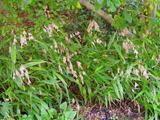Native Plants

Q. Who is Mr. Smarty Plants?
A: There are those who suspect Wildflower Center volunteers are the culpable and capable culprits. Yet, others think staff members play some, albeit small, role. You can torture us with your plant questions, but we will never reveal the Green Guru's secret identity.
Did you know you can access the Native Plant Information Network with your web-enabled smartphone?
Ask Mr. Smarty Plants is a free service provided by the staff and volunteers at the Lady Bird Johnson Wildflower Center.

rate this answer
Saturday - December 15, 2007
From: Pearland, TX
Region: Southwest
Topic: Grasses or Grass-like
Title: Grasses for dry bottom detention ponds
Answered by: Nan Hampton
QUESTION:
I am working on a project for my HOA in order to reduce mowing costs and to beautify our neighborhood. We were wondering if you could help us find people knowledgeable about dry bottom detention ponds and grasses that could be used that were slow growing, required little fertilizer but could have a strong enough root structure to maintain the slopes of a detention pond(s). We are located in Pearland, TXANSWER:
Please see our National Suppliers Directory for information about Landscape Professionals and Environmental Consultants in your area who might be knowledgeable about dry bottom detention ponds.Grasses are excellent plants for stabilizing slopes because of their extensive fibrous root systems and native grasses require no, or very little, fertilizer. If the detention pond is in a primarily sunny area, then an excellent choice for a grass is Bouteloua dactyloides (buffalograss) since it grows slowly and doesn't require frequent mowing. However, it will not deal well with standing water which may happen with your detention pond. You would probably be better off with plants that are appropriate to a raingarden situation—plants that tolerate standing in water but can also thrive when the water dries up completely. Sedges (such as Carex blanda (eastern woodland sedge), Carex cherokeensis (Cherokee sedge) or Carex texensis (Texas sedge)) are grasslike, don't grow too tall, and can withstand both wet and dry situations.
You might also consider ornamental grasses that are pleasing to look at without needing to be mowed, for instance:
Andropogon glomeratus (bushy bluestem), Chasmanthium latifolium (Inland sea oats), and Muhlenbergia capillaris (Gulf muhly).
You can see other suggestions for raingarden plants in the answer to a previous question.
More Grasses or Grass-like Questions
Replacement for St. Augustine grass
July 29, 2009 - I live in Georgetown, TX. I have an acre lot with many large Live Oak Trees. Currently we have St Augustine grass growing, but with the drought, it's not working out well with rainbirds putting down ...
view the full question and answer
Drought tolerant plants for MA
August 28, 2011 - We have some very very poor soil at our house on Cape Cod and are looking for plants that will take low water and sandy soil. Also we are high on a hill and quite exposed to the elements. The plot get...
view the full question and answer
Quick and EZ way to cover bare spots in lawn with grass
March 09, 2015 - We recently had to dig up our lawn to have a pipe replaced. We now have a long strip of our yard that is either dug up or covered by some of the dirt that is dug up. We want to fill in the grass. W...
view the full question and answer
Suggestions for Texas native plants for memorial
June 30, 2005 - A dear friend of ours has passed and we would like some ideas of a native Texas plant we could plant in memory of her. It will be grown in the hill region near Houston. Thank you.
view the full question and answer
Trimming inland sea oats from Waco TX
January 30, 2013 - Re: Inland Sea Oats and trimming back in early spring
"It passes through most of winter a soft brown, but becomes tattered and gray by February, a good time to cut it back to the basal rosette." ...
view the full question and answer
| Support the Wildflower Center by Donating Online or Becoming a Member today. |

